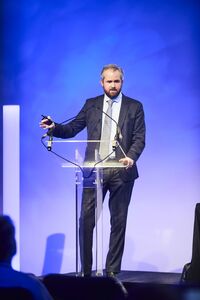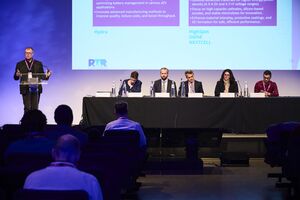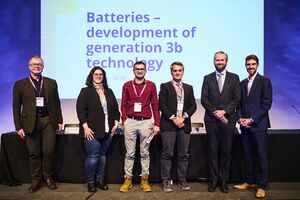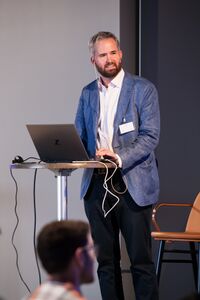m (add smart forklart link) |
mNo edit summary |
||
| (24 intermediate revisions by the same user not shown) | |||
| Line 1: | Line 1: | ||
== Biography == | == Biography == | ||
== | === Early life and education === | ||
Dr. Clark was born 1987 in Columbus, GA USA. He studied at the {{Template:Viewer/Link|page=Item:OSWf1fcf1be81cc4a6eb653a90fed1d7a60|url=|label=Georgia Institute of Technology}} and earned his bachelor degree in Mechanical Engineering in 2009. For his doctoral research, Clark worked with Prof. Dr. Arnulf Latz and Prof. Dr. Birger Horstmann at the {{Template:Viewer/Link|page=Item:OSW5532738929f343158a49b02c06b1fa69|url=|label=German Aerospace Centre (DLR)}} and {{Template:Viewer/Link|page=Item:OSW4d722e0f0d764f6d99c9f363dbb18782|url=|label=Helmholtz Institute Ulm (HIU)}} to develop a new continuum modelling framework for aqueous near-neutral zinc-air battery cells. He earned his Dr. rer. nat. degree ''summa cum laude'' from {{Template:Viewer/Link|page=Item:OSW1c612949280e4113a98e35842fbd6fb2|url=|label=Ulm University}} in 2019. | |||
=== Career === | |||
After graduating from {{Template:Viewer/Link|page=Item:OSWf1fcf1be81cc4a6eb653a90fed1d7a60|url=|label=Georgia Tech}} in 2009, Clark first worked as a design simulation engineer in the German spaceflight industry from 2010-2013. He contributed to the design of laser communication hardware on Earth observation satellites like {{Template:Viewer/Link|page=|url=https://www.esa.int/Applications/Observing_the_Earth/Copernicus/Sentinel-1|label=Sentinel 1}} and {{Template:Viewer/Link|page=|url=https://www.esa.int/Applications/Observing_the_Earth/Copernicus/Sentinel-2|label=Sentinel 2}}. He also designed the mirror hardware for one of the telescopes on {{Template:Viewer/Link|page=|url=https://www.esa.int/Science_Exploration/Space_Science/Solar_Orbiter|label=Solar Orbiter}}. | |||
In 2018, he joined {{Template:Viewer/Link|page=Item:OSWc6aa8b354453443aad6679c194a506f7|url=|label=SINTEF}} in Trondheim, Norway to work on battery digitalization topics. He has a leading role in EU-funded research projects like {{Template:Viewer/Link|page=Item:OSW6499d04ced9649f8bbc50f1e940a50c8|url=|label=Battery2030+}}, {{Template:Viewer/Link|page=Item:OSWa447d5f341294108879be0aac68cb1a4|url=|label=BIG-MAP}}, {{Template:Viewer/Link|page=Item:OSWd364682b4d274585b8ab6fb6d237d890|url=|label=DigiBatt}}, {{Template:Viewer/Link|page=Item:OSWb4132e89309a4a16a1c292598ae9ef29|url=|label=IntelLiGent}}, {{Template:Viewer/Link|page=Item:OSWbdaefbf2beb045c3912dcf136a804834|url=|label=HYDRA}}, and more. His current activities focus on bringing battery data into the Semantic Web and enabling fast physics-based design simulations. He is a core developer of the Battery Interface Ontology (BattINFO) and the {{Template:Viewer/Link|page=Item:OSW09ea8864ce8f4d559b6fa60300faa976|url=|label=Battery Modelling Toolbox (BattMo)}} | |||
== Technical Expertise == | |||
Dr. Clark has extensive experience in developing and implementing advanced simulation methodologies for electrochemical systems. His expertise spans continuum modelling and numerical methods, with a focus on practical applications in battery research, hydrogen fuel cells, and electrolyzers. His work includes the formulation of physics-based continuum models that describe transport phenomena, reaction kinetics, and thermodynamics within electrochemical devices. These models serve as foundational tools for understanding and optimizing energy storage and conversion systems. | |||
=== Simulation Methodology === | |||
Dr. Clark specializes in the use of finite element and finite volume methods. Through these numerical approaches, he has developed high-fidelity simulations that account for multiphysics interactions, including electrochemical, thermal, and mechanical effects. | |||
=== Electrochemical Devices === | |||
==== Batteries ==== | |||
Dr. Clark has expertise across various electrochemical devices, with significant contributions to battery research. He has worked on lithium-ion, zinc-based, and post-lithium battery chemistries, developing models that predict performance, degradation, and efficiency losses. His research has linked electrode- and particle-level processes to full-cell behaviour, enabling a more comprehensive understanding of battery operation. His modelling efforts are closely integrated with experimental validation, where data-driven parameterization techniques ensure that simulation outputs accurately reflect real-world performance. | |||
==== Hydrogen Fuel Cells ==== | |||
Clark has also worked extensively on hydrogen fuel cells, particularly in the area of model-based design optimization. His research has addressed flow field optimization to improve reactant distribution and pressure uniformity, leading to enhanced power output and fuel utilization. He has investigated gas diffusion layers and microporous layers, focusing on water management strategies and transport limitations that impact overall efficiency. His work aims to refine the operational characteristics of fuel cells to meet the stringent demands of automotive, aerospace, and stationary applications. | |||
==== Electrolyzers ==== | |||
In the field of electrolyzers, Clark employs model-based design optimization to enhance the efficiency of hydrogen production. His research has explored electrode architecture optimization, seeking to improve mass transport and reaction kinetics at the electrochemical interface. He has developed coupled thermal and electrochemical models to better understand the heat generation and dissipation processes in electrolyzer operation. His degradation modelling efforts have provided insights into long-term performance, helping to predict system durability under varying operational conditions. | |||
=== Semantic Web === | |||
Dr. Clark is actively involved in semantic data integration and ontology-driven knowledge representation in battery research. He has played a leading role in ontology development for electrochemical systems, ensuring alignment with the Elementary Multiperspective Materials Ontology (EMMO). His work has contributed to domain ontologies that standardize descriptions of battery components, test methods, and performance data, facilitating machine-readable data exchange across different research platforms. He has worked on linked data approaches that improve data interoperability, bridging experimental, modelling, and industrial datasets to enhance collaboration and knowledge sharing. His efforts in semantic web technologies align with the principles of findability, accessibility, interoperability, and reusability, ensuring that battery-related data is structured in a way that maximizes reuse and knowledge discovery. | |||
== Recorded Lectures == | |||
{| class="wikitable" | |||
|+ | |||
!Year | |||
!Lecture | |||
|- | |||
|2024 | |||
|{{Template:Viewer/Link|page=Item:OSWc33f24b5c96247f2b7410893f6ae1627|url=|label=Digital Tools for Accelerating Innovation in Energy Storage}} | |||
|- | |||
| | |||
| | |||
|- | |||
| | |||
| | |||
|} | |||
Digital Tools for Accelerating Innovation in Energy Storage | |||
== Selected publications == | |||
A list of publications is available on Dr. Clark's {{Template:Viewer/Link|page=|url=https://orcid.org/0000-0002-8758-6109|label=ORCID}}and {{Template:Viewer/Link|page=|url=https://scholar.google.no/citations?user=YyXXh8UAAAAJ&hl=en|label=Google Scholar}} pages. | A list of publications is available on Dr. Clark's {{Template:Viewer/Link|page=|url=https://orcid.org/0000-0002-8758-6109|label=ORCID}}and {{Template:Viewer/Link|page=|url=https://scholar.google.no/citations?user=YyXXh8UAAAAJ&hl=en|label=Google Scholar}} pages. | ||
{| class="wikitable" | {| class="wikitable" | ||
| Line 39: | Line 83: | ||
== Popular Science Contributions == | == Popular Science Contributions == | ||
=== TEDx 2023 === | ==== TEDx 2023 ==== | ||
{{#ev:youtube|EFNPYWI2mqI|||The green transition depends on the reinvention of battery technology - Simon Clark - TEDxTrondheim}} | {{#ev:youtube|EFNPYWI2mqI|||The green transition depends on the reinvention of battery technology - Simon Clark - TEDxTrondheim}} | ||
=== Podcast Smart Forklart 2024 === | ==== Podcast Smart Forklart 2024 ==== | ||
{{Template:Viewer/Link|page=|url=https://shows.acast.com/60b75c5b8c26f80013d5ebce/episodes/66c6c8aaf308cd1af3289a44?|label=}} | {{Template:Viewer/Link|page=|url=https://shows.acast.com/60b75c5b8c26f80013d5ebce/episodes/66c6c8aaf308cd1af3289a44?|label=Smart Forklart 110. The next generation of electric car batteries, Thursday 22. August 2024}} | ||
Learn how batteries work, and how scientists have improved both performance and sustainability (and reduced cost) in the new generation of batteries. | |||
=== Images === | |||
{{Template:Viewer/Media | |||
| image_size = 300 | |||
| mode = slideshow | |||
| textdata = File:OSWf22cc6403053449d91f692cb16931bb9.jpg{{!}}Simon Clark speaking at the Road Transport Research Conference in 2025; | |||
File:OSW6e881ed7d7d74b55bc92f610ab9941f9.jpg{{!}}Generation 3b speaker panel at the Road Transport Research Conference 2025; | |||
File:OSW840f35e7f43f4894b570525ee52d5fde.jpg{{!}}Generation 3b speaker panel at the Road Transport Research Conference 2025; | |||
File:OSW7de87991182a4e1bbb52617a15ab98b9.jpg{{!}}Dr. Simon Clark presenting at the HYDRA / Battery2030+ joint workshop in Oslo, Norway 2024; | |||
}} | |||
| jsondata | |||
|---|---|---|---|
| Line 13: | Line 13: | ||
], | ], | ||
"phone_number": [ | "phone_number": [ | ||
"+47 41314004" | "+47-41314004" | ||
], | ], | ||
"uuid": "72e733f3-17ef-4cf9-b8ca-53e906c9acb9", | "uuid": "72e733f3-17ef-4cf9-b8ca-53e906c9acb9", | ||
| Line 24: | Line 24: | ||
"description": [ | "description": [ | ||
{ | { | ||
"text": "Senior Research Scientist | "text": "An American-Norwegian Scientist. Dr. Clark works on battery digitalization topics and is a leader in European battery research policy and coordination groups. He is currently employed as a Senior Research Scientist at SINTEF. ", | ||
"lang": "en" | "lang": "en" | ||
} | } | ||
| Line 44: | Line 44: | ||
], | ], | ||
"attachments": [ | "attachments": [ | ||
"File:OSW6b10f97611104618bb49d9755a6bc4b1.png" | "File:OSW6b10f97611104618bb49d9755a6bc4b1.png", | ||
"File:OSWf22cc6403053449d91f692cb16931bb9.jpg", | |||
"File:OSW6e881ed7d7d74b55bc92f610ab9941f9.jpg", | |||
"File:OSW840f35e7f43f4894b570525ee52d5fde.jpg", | |||
"File:OSW7de87991182a4e1bbb52617a15ab98b9.jpg" | |||
], | |||
"website": [ | |||
"https://scholar.google.com/citations?user=YyXXh8UAAAAJ\u0026hl" | |||
] | ] | ||
} | } | ||
Latest revision as of 00:00, 21 February 2025
| Simon Clark | |
|---|---|
| ID | OSW72e733f317ef4cf9b8ca53e906c9acb9 |
| UUID | 72e733f3-17ef-4cf9-b8ca-53e906c9acb9 |
| Label | Simon Clark |
| Machine compatible name | SimonClark |
 |
|
| Statements (outgoing) | |
| Statements (incoming) | |
|
|
|
Description
An American-Norwegian Scientist. Dr. Clark works on battery digitalization topics and is a leader in European battery research policy and coordination groups. He is currently employed as a Senior Research Scientist at SINTEF.
| Item | |
|---|---|
| Type(s)/Category(s) | User |
| Person | |
|---|---|
| First name | Simon |
| Middle name | |
| Surname | Clark |
| HR info | |
| Organization | SINTEF |
| Department | SINTEF Battery Technology |
| Located at | SINTEF Battery Lab |
| Contact | |
| simon.clark@sintef.no |
|
| Website | https://scholar.google.com/citations?user=YyXXh8UAAAAJ&hl |
| ORCID iD | https://orcid.org/0000-0002-8758-6109 |
| Phone number | +47-41314004 |
| Fax number | |
| Expertise | |
| Role | Senior Research Scientist |
| Competence | |
| Topic | |
| Projects | |
| Member of | Battery 2030+, DigiBatt, HYDRA, IntelLiGent |
| Lead of | BattMo |
| User | |
|---|---|
| Username | |
| Abbreviation | |
| Office | |
| Superior | |
Biography
Early life and education
Dr. Clark was born 1987 in Columbus, GA USA. He studied at the Georgia Institute of Technology and earned his bachelor degree in Mechanical Engineering in 2009. For his doctoral research, Clark worked with Prof. Dr. Arnulf Latz and Prof. Dr. Birger Horstmann at the German Aerospace Centre (DLR) and Helmholtz Institute Ulm (HIU) to develop a new continuum modelling framework for aqueous near-neutral zinc-air battery cells. He earned his Dr. rer. nat. degree summa cum laude from Ulm University in 2019.
Career
After graduating from Georgia Tech in 2009, Clark first worked as a design simulation engineer in the German spaceflight industry from 2010-2013. He contributed to the design of laser communication hardware on Earth observation satellites like Sentinel 1 and Sentinel 2. He also designed the mirror hardware for one of the telescopes on Solar Orbiter.
In 2018, he joined SINTEF in Trondheim, Norway to work on battery digitalization topics. He has a leading role in EU-funded research projects like Battery2030+, BIG-MAP, DigiBatt, IntelLiGent, HYDRA, and more. His current activities focus on bringing battery data into the Semantic Web and enabling fast physics-based design simulations. He is a core developer of the Battery Interface Ontology (BattINFO) and the Battery Modelling Toolbox (BattMo)
Technical Expertise
Dr. Clark has extensive experience in developing and implementing advanced simulation methodologies for electrochemical systems. His expertise spans continuum modelling and numerical methods, with a focus on practical applications in battery research, hydrogen fuel cells, and electrolyzers. His work includes the formulation of physics-based continuum models that describe transport phenomena, reaction kinetics, and thermodynamics within electrochemical devices. These models serve as foundational tools for understanding and optimizing energy storage and conversion systems.
Simulation Methodology
Dr. Clark specializes in the use of finite element and finite volume methods. Through these numerical approaches, he has developed high-fidelity simulations that account for multiphysics interactions, including electrochemical, thermal, and mechanical effects.
Electrochemical Devices
Batteries
Dr. Clark has expertise across various electrochemical devices, with significant contributions to battery research. He has worked on lithium-ion, zinc-based, and post-lithium battery chemistries, developing models that predict performance, degradation, and efficiency losses. His research has linked electrode- and particle-level processes to full-cell behaviour, enabling a more comprehensive understanding of battery operation. His modelling efforts are closely integrated with experimental validation, where data-driven parameterization techniques ensure that simulation outputs accurately reflect real-world performance.
Hydrogen Fuel Cells
Clark has also worked extensively on hydrogen fuel cells, particularly in the area of model-based design optimization. His research has addressed flow field optimization to improve reactant distribution and pressure uniformity, leading to enhanced power output and fuel utilization. He has investigated gas diffusion layers and microporous layers, focusing on water management strategies and transport limitations that impact overall efficiency. His work aims to refine the operational characteristics of fuel cells to meet the stringent demands of automotive, aerospace, and stationary applications.
Electrolyzers
In the field of electrolyzers, Clark employs model-based design optimization to enhance the efficiency of hydrogen production. His research has explored electrode architecture optimization, seeking to improve mass transport and reaction kinetics at the electrochemical interface. He has developed coupled thermal and electrochemical models to better understand the heat generation and dissipation processes in electrolyzer operation. His degradation modelling efforts have provided insights into long-term performance, helping to predict system durability under varying operational conditions.
Semantic Web
Dr. Clark is actively involved in semantic data integration and ontology-driven knowledge representation in battery research. He has played a leading role in ontology development for electrochemical systems, ensuring alignment with the Elementary Multiperspective Materials Ontology (EMMO). His work has contributed to domain ontologies that standardize descriptions of battery components, test methods, and performance data, facilitating machine-readable data exchange across different research platforms. He has worked on linked data approaches that improve data interoperability, bridging experimental, modelling, and industrial datasets to enhance collaboration and knowledge sharing. His efforts in semantic web technologies align with the principles of findability, accessibility, interoperability, and reusability, ensuring that battery-related data is structured in a way that maximizes reuse and knowledge discovery.
Recorded Lectures
| Year | Lecture |
|---|---|
| 2024 | Digital Tools for Accelerating Innovation in Energy Storage |
Digital Tools for Accelerating Innovation in Energy Storage
Selected publications
A list of publications is available on Dr. Clark's ORCIDand Google Scholar pages.
| Title | Journal | Year | DOI |
|---|---|---|---|
| A roadmap for transforming research to invent the batteries of the future designed within the european large scale research initiative battery 2030+ | Advanced Energy Materials | 2022 | https://doi.org/10.1002/aenm.202102785 |
| Innovative zinc-based batteries | Journal of Power Sources | 2021 | https://doi.org/10.1016/j.jpowsour.2020.229309 |
| Rational development of neutral aqueous electrolytes for zinc–air batteries | ChemSusChem | 2017 | https://doi.org/10.1002/cssc.201701468 |
| Digitalization of battery manufacturing: current status, challenges, and opportunities | Advanced Energy Materials | 2022 | https://doi.org/10.1002/aenm.202102696 |
| Toward a unified description of battery data | Advanced Energy Materials | 2022 | https://doi.org/10.1002/aenm.202102702 |
Popular Science Contributions
jsondata
| username | "" | |||||
|---|---|---|---|---|---|---|
| type |
| |||||
| first_name | "Simon" | |||||
| surname | "Clark" | |||||
| organization |
| |||||
| ||||||
| phone_number |
| |||||
| uuid | "72e733f3-17ef-4cf9-b8ca-53e906c9acb9" | |||||
| label |
| |||||
| description |
| |||||
| orcid | "https://orcid.org/0000-0002-8758-6109" | |||||
| iri | "https://w3id.org/batterykg/person#72e733f3-17ef-4cf9-b8ca-53e906c9acb9" | |||||
| name | "SimonClark" | |||||
| image | "File:OSW32db744f9de6466ca071428977a5b841.jpg" | |||||
| competence |
| |||||
| keywords |
| |||||
| organizational_unit |
| |||||
| role |
| |||||
| located_in |
| |||||
| attachments |
| |||||
| website |
|








